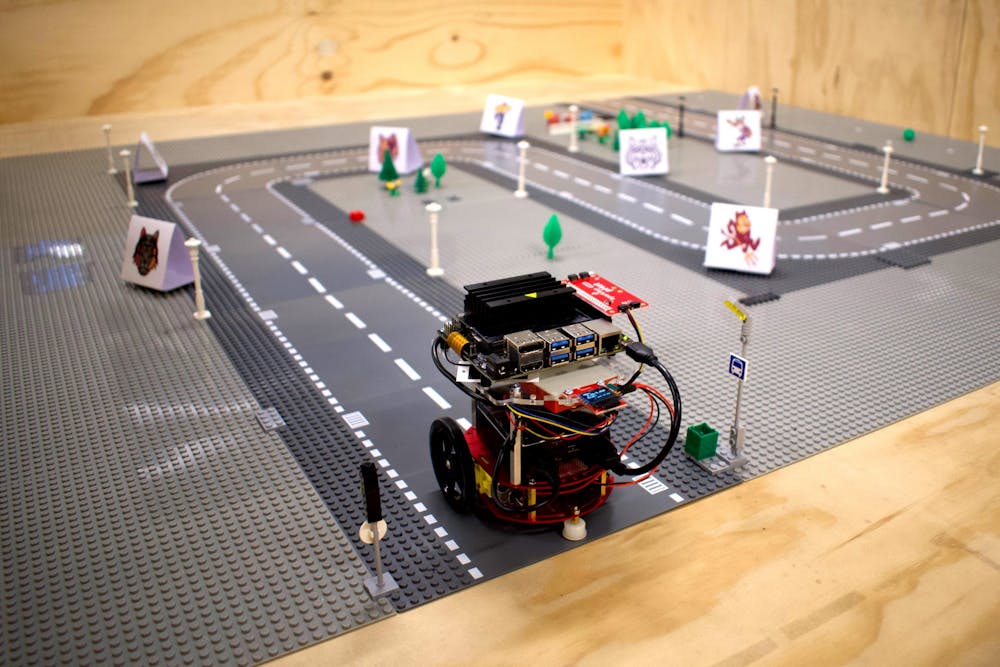This past weekend, the University Technology Office hosted Arizona’s first ever Robo Hackathon, and an ASU team took home first prize.
For the 2019 Robo Hackathon, students were given artificial intelligence robot kits by sponsors, and their mission was to assemble and program the machine to perform five tasks. Teams representing colleges from all over Arizona competed.
Hackathons are events that usually last a few days, and participants race around the clock to complete a goal or project that meets certain requirements. They provide a chance for students in various software development disciplines to test their abilities. Students generally sleep very little, if at all, throughout the event.
Participants received a SparkFun JetBot AI Kit, which is a template for students to create their own unique AI robot, powered by the Jetson Nano Developer Kit by NVIDIA. The robots worked with applications developed by students using an Amazon Web Services RoboMaker simulation environment.
The students' performances were judged for assembling the robot, making it spin and navigating a track. For the hacking component, students had to make the robot perform a unique task. A step in which the bot was supposed to recognize its school's mascot was removed because a bug was discovered in the code that could not be mended in time.
Yinong Chen, a principal lecturer with the School of Computing, Informatics and Decision Systems Engineering and adviser for the event, said that part of a hackathon is establishing strengths and weaknesses in new technology.
“That is what a Hackathon is about, we try to hack around to figure out what the problems are,” Chen said.
John Rome, the deputy chief information officer for the University Technology Office, said in addition to cash prizes and bragging rights, these events are a good opportunity for students to be noticed by potential employers.
“You’re going to have to overcome all these obstacles, and I think that’s part of the hackathon,” Rome said. “You know that there’s going to be a lot of ambiguity and a lot of challenges that you didn’t expect.”
Samantha Becker, creative and communications executive director for the University Technology Office (UTO) said having teams encourages students with diverse skill sets to collaborate.
“You can really think of the Robo Hackathon, this competition which is really team-based, as a microcosm of the workforce and what it takes to be successful entrepreneurs,” Becker said.
Becker also said this event demonstrates some of ASU and the UTO’s core values.
“It really brings out the way that ASU and UTO of course are valuing entrepreneurship, and that starts with our students,” Becker said.
A team of students from the Ira A. Fulton Schools of Engineering won first place, taking home a $5,000 prize. Chris Harsh, Riley Tallman, Shabab Siddique, Tyriq Hayes and Xina Tang’s team, named Lightspeed, completed their fastest run around the track in 9 minutes and 24 seconds.
Chen advised the winning team, and he said this event was able to be made part of their capstone project.
“They’ve been working really hard, and they didn't sleep for 48 hours,” Chen said. “You need to be well prepared, you also need a little bit of luck.”
Chen also said the experience with cutting edge technology gave the students a preview into their careers in software development.
Tallman, a senior computer science major, wrote in an email that the team was satisfied that their efforts paid off.
"Despite many difficulties, the team worked persistently throughout the Hackathon, and in the end it was worth it," Tallman said. "We enjoyed applying machine learning to the Sparkfun Jetbot, and it was incredibly rewarding to show it off and see our hard work in action."
Tang, a senior computer science major, described the experience of winning as "unreal."
"After the first place team was announced, it felt unreal," Tang said in an email. "Even when we had our pictures taken with the giant check, it ... still felt unreal for me ... leading up to the announcement of the winners for the hackathon. I hadn't really put much thought into whether or not our team would win."
Rome said hackathons, which are held every semester, are often designed with some kind of social goal that goes along with the technical aspect of the event.
“This hackathon is focused on technology. (The) next one will focus more around student services and social impact of how we can build bots to help our students,” Rome said.
Reach the reporter at gmlieber@asu.edu or follow @G_Mira_ on Twitter.
Like The State Press on Facebook and follow @statepress on Twitter.




